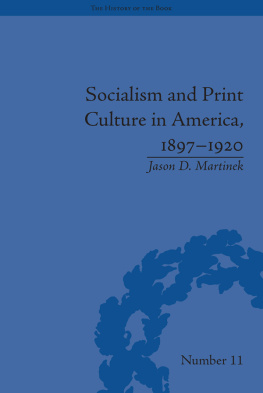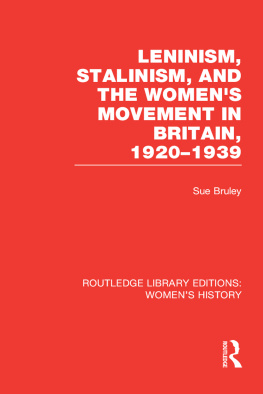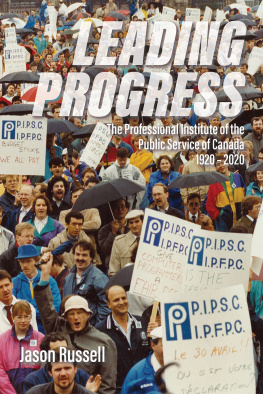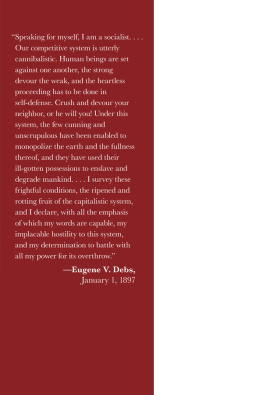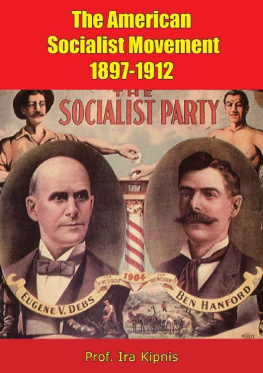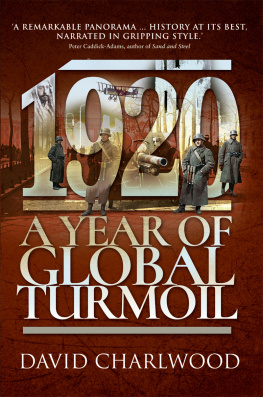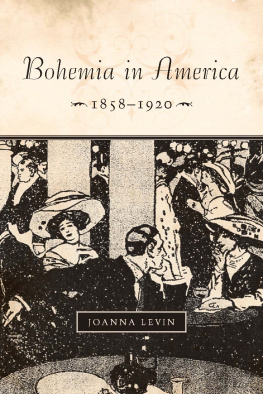SOCIALISM AND PRINT CULTURE IN AMERICA, 18971920
THE HISTORY OF THE BOOK
Series Editor: Ann R. Hawkins
TITLES IN THIS SERIES
1 Conservatism and the Quarterly Review: A Critical Analysis
Jonathan Cutmore (ed.)
2 Contributors to the Quarterly Review: A History, 18091825
Jonathan Cutmore
3 Wilkie Collinss American Tour, 18731874
Susan R. Hanes
4 William Blake and the Art of Engraving
Mei-Ying Sung
5 Charles Lamb, Elia and the London Magazine: Metropolitan Muse
Simon P. Hull
6 Reading in History: New Methodologies from the Anglo-American Tradition
Bonnie Gunzenhauser (ed.)
7 Middle-Class Writing in Late Medieval London
Malcolm Richardson
8 Readings on Audience and Textual Materiality
Graham Allen, Carrie Griffin and Mary OConnell (eds)
9 Romantic Marginality: Nation and Empire on the Borders of the Page
Alex Watson
10 Wordsworths Poetic Collections, Supplementary Writing and Parodic Reception
Brian R. Bates
FORTHCOMING TITLES
Elizabeth Inchbalds Reputation: A Publishing and Reception History
Ben P. Robertson
Art and Commerce in the British Short Story, 18801950
Dean Baldwin
SOCIALISM AND PRINT CULTURE IN AMERICA, 18971920
BY
Jason D. Martinek
First published 2012 by Pickering & Chatto (Publishers) Limited
Published 2016 by Routledge 2 Park Square, Milton Park, Abingdon, Oxon OX14 4RN 711 Third Avenue, New York, NY 10017, USA
Routledge is an imprint of the Taylor & Francis Group, an informa business
Taylor & Francis 2012
Jason D. Martinek 2012
To the best of the Publishers knowledge every effort has been made to contact relevant copyright holders and to clear any relevant copyright issues. Any omissions that come to their attention will be remedied in future editions.
All rights reserved, including those of translation into foreign languages. No part of this book may be reprinted or reproduced or utilised in any form or by any electronic, mechanical, or other means, now known or hereafter invented, including photocopying and recording, or in any information storage or retrieval system, without permission in writing from the publishers.
Notice:
Product or corporate names may be trademarks or registered trademarks, and are used only for identification and explanation without intent to infringe.
BRITISH LIBRARY CATALOGUING IN PUBLICATION DATA
Martinek, Jason D.
Socialism and print culture in America, 18971920. (The history of the book)
1. Socialism United States History 20th century. 2. Books and reading
Political aspects United States History 20th century. 3. Literacy Political
aspects United States History 20th century.
I. Title II. Series
335.0097309041-dc23
ISBN-13: 978-1-84893-334-7 (hbk)
Typeset by Pickering & Chatto (Publishers) Limited
CONTENTS
I am very grateful for all of the help that I received along the way in producing this book. New Jersey City University, the Huntington Library, the William Morris Society, the Newberry Library, the American Historical Association, Indiana State University and Carnegie Mellon University all provided financial support at various stages of this project.
I also owe deep appreciation to a number of people who commented on part or all of the manuscript, especially Scott A. Sandage, Daniel P. Resnick, Jacqueline Ellis and Jacob Zumoff. Additionally, I am grateful to the series editor, Ann R. Hawkins, who saw such promise in my original proposal. I would be remiss if I did not simultaneously offer my thanks to Mark Pollard, Publishing Director at Pickering & Chatto.
Finally, I would like to thank the following individuals, who provided an invaluable support network, both scholarly and personal: Rosemary Fox Thurston, Robert Thurston, Jose Morales, Tim White, Rosamond Hooper-Hamersley, Patricia Catrillo, Jo Anne Bruno, Fred Smith, Joe Ruffner, Kristi Foster, Rachel Steury, Fiona Seels, Anthony Lowe, Lisa Campbell, Helen Smith, Carl Zimring, Jen Potter, Daniel Rutledge, G. Mark Henrickson, Gabriella Petrick, Maritza Gulin, Nathan Godfried, Richard Schneirov, my Study of History students and my family, especially my little sister, Jennifer Quinata.
I dedicate this book to my wife, Liz.
If American socialists in the Progressive Era had a central axiom, it was Workers of the World, Read! Indeed, for turn-of-the-twentieth-century socialists, reading was a radical act. It engendered grass-roots political activism, subverted dominant values and, in their estimation, provided a viable means of securing a new moral order, in which human beings came before the almighty dollar. An 1895 article in the popular socialist newspaper, the Appeal to Reason, underscored what was at stake for the socialist movement: Read the books on political economy that your masters do not want you to read. The truth will make you free a condition you do not even know of.
This book tells the story of American socialists use of literacy and how it shaped the larger contours of the socialist movement. It focuses on Debsian socialism in particular, the movement that coalesced around Eugene V. Debs, five-time socialist candidate for president of the United States (1900, 1904, 1908, 1912 and 1920). It covers the period between the transformation of the American Railway Union into the Social Democracy of America in 1897 to the eclipse of the American socialist movement in the late 1910s. Although Debs is an important figure in the story, this book broadens the focus to include a number of instrumental writers, editors and publishers who contributed to what I refer to throughout the book as a rich print culture of dissent.
This phrase print culture of dissent gets right to the heart of what it was that socialists created between 1897 and 1917. Insofar as many issues divided socialists, upon one point they tended to agree. Change began with education the best way to educate was through print.is not as though these cultural arenas were not themselves sometimes circumscribed by the limits of the age. However, socialists print culture of dissent did help to make questions of class a matter of national debate as hitherto unknown in American history. In the process, socialists merged old and new protest traditions to bring forth a distinctly American brand of Marxism.
By focusing on how socialists radicalized literacy, I cast new light on the turn-of-the-twentieth-century American socialist movement. Indeed, by reconceptualizing the usual question asked about American socialism Why did socialism fail in the United States? to What were the possibilities and limitations of reading as an agent of change? I am able to consider the complex relationships between consciousness and agency, reading and social movements.
I.
It was no accident that socialism emerged when it did as a mass movement. Coming alongside the heyday of the book in the United States, the movement benefited from the printed words dominant place in American culture.
The primacy of print was not lost on socialists. Who of us does not trace his own conversion to printed words that have all at once roused him from apathy and heartlessness and have given us new, soul-stirring hopes? asked another


